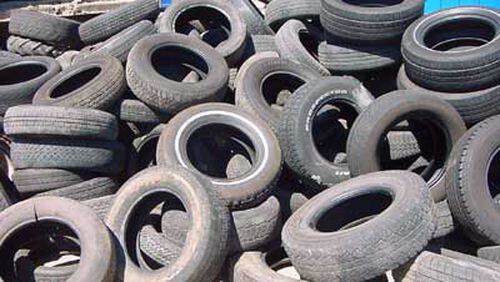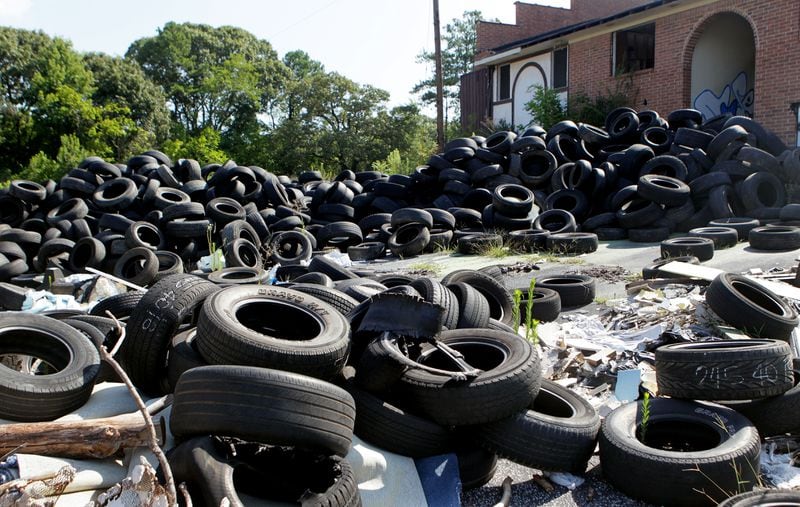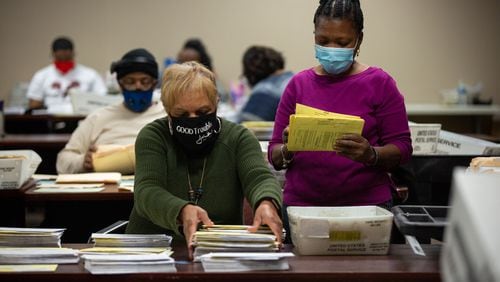When scientists think of a “biomass” fuel, organic materials like wood pellets, timber scraps or other plant matter that can be burned typically comes to mind.
But recent votes by the Georgia Public Service Commission (PSC) have stretched that definition, potentially allowing facilities to add scrap tires and even natural gas to the mix they burn to produce electricity.
The change has led to an uproar from environmental groups, who say the the five-member elected utility regulator skirted its normal processes to push the change through without adequately considering potential pollution impacts.
Biomass power plants produce electricity through a crude process that involves burning organic material in boilers to produce steam. Biomass is more widely used for power in Europe than in the U.S., though Georgia Power’s long range energy plans approved by the PSC require the utility to purchase more electricity from biomass facilities in the years ahead.
The quest to add tires to the list of approved fuels began at a March 30 meeting of the PSC, when discussion turned to Georgia Power’s plan to source more electricity from biomass plants.
During the meeting, biomass industry representatives came to the podium one after the other with a similar request: To improve the reliability and profitability of their projects, the approval of an “alternative fuel” would be helpful.
The alternative they suggested was scrap tires, known in the power industry as tire-derived fuel (TDF).
Less than a week later at the PSC’s next session, District 1 Commissioner Jason Shaw (R-Lakeland) proposed expanding the list of allowable biomass fuels to include both the burning of tire scraps and natural gas. Shaw also moved to cap the amount of tires that plants can mix into their boilers at 20% of a unit’s total heat input.
Credit: Steve Schaefer
Credit: Steve Schaefer
The motions passed 4-to-1, with Chairman Tricia Pridemore the lone dissenter on each. A PSC order finalizing the change was issued April 21.
Late last month, the Southern Environmental Law Center (SELC) and the Sierra Club sent a petition to the commission asking it to revoke its order.
No lawsuit has been filed yet, but the groups argued that the commission’s moves were unlawful because they did not provide 30 days notice or allow public hearings before voting on the changes. They also argued that the PSC failed to show that allowing electricity to be generated by burning tires was in the public interest.
Commissioner Shaw, who proposed the change, said the environmental groups raised “compelling reasons to take another look at this,” but said he was not ready to commit to next steps.
“I was following what advice I was given by our legal team and I’ll continue to do that,” he added.
If the commission’s order stands, only projects that successfully bid to fill Georgia Power’s biomass needs could potentially burn tire scraps. But even Georgia Power says it’s not on board with the change.
“Although Georgia Power will follow whatever the Commission ultimately orders, Georgia Power does not support adding tire-derived fuel to its 2022 Integrated Resource Plan,” Georgia Power spokesman John Kraft said in a statement, referring to the company’s long-range energy roadmap approved last year by the PSC. That plan requires the company to add 140 megawatts of biomass to its electricity portfolio in the coming years.
How clean is biomass?
Burning biomass contributes roughly the same amount of heat-trapping emissions as fossil fuel combustion. But as trees and plants that are burned grow back, they can — in theory — pull the carbon dioxide that was released back out of the air, creating a sustainable loop that adds fewer greenhouse gases to the atmosphere.
Georgia is one of the country’s top producers of wood pellets and other organic material that is burned in biomass power plants, particularly overseas. Residents near some wood pellet processing facilities in Georgia have raised concerns about exposure to chemicals and other environmental impacts.
Climate scientists have also warned that biomass is more harmful to the environment than advertised. Biomass is, however, generally considered a more climate-friendly energy source than fossil fuels like coal or natural gas.
But environmental advocates argue that allowing tires to be added to the mix dramatically changes that equation.
While some tire rubber is derived from plants, modern tires also contain synthetic rubbers made from fossil fuels. Burning tires is also known to produce a host of potentially hazardous air pollutants.
“You grew up your whole life being told not to burn tires,” said Codi Norred, the executive director of Georgia Interfaith Power and Light (GIPL), a nonprofit that partners with religious organizations across the state on environmental issues. “We work with faith groups all across the state doing river cleanups pulling tires out of rivers and waterways, and I don’t think by any stretch of the imagination that the people cleaning up those tires want them to be burned.”
‘A step backward’
The federal Environmental Protection Agency (EPA) recognizes TDF as a viable alternative to fossil fuels or as a supplement to burning coal or wood.
Tire remnants are already burned in at least one biomass-to-electricity plant run by a company called Green Power Solutions in Dublin, southeast of Macon. Tires are also used as fuel in some industrial manufacturing facilities that requires lots of heat, like cement kilns.
Glen Hill, the general manager of Green Power Solutions, told commissioners March 30 that adding tire scraps to its fuel mix helps balance the inconsistent heat content in biomass materials.
“You can have a more stable boiler and a more stable electrical product coming out of it,” he said.
Hill declined to provide emissions data, but said the plant complies with state standards. Any new biomass facilities seeking to burn TDF would need to first obtain permits from the Georgia Environmental Protection Division.
Credit: Steve Schaefer/AJC
Credit: Steve Schaefer/AJC
Still, federal EPA guidance suggests that recycling tires, when possible, is a cleaner option than burning their scraps for energy.
PSC Chair Pridemore panned burning tire scraps, noting the “great strides” the state has made to clean up its energy mix.
“Burning tires, in my opinion, is a step backward,” she said.
A note of disclosure
This coverage is supported by a partnership with 1Earth Fund, the Kendeda Fund and Journalism Funding Partners. You can learn more and support our climate reporting by donating at ajc.com/donate/climate/










